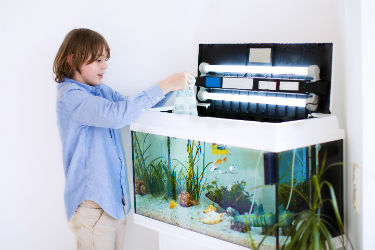Veterinarian Tips: Aquariums Aren’t Only for Fish!

When clients aren’t looking for a fish, but still want a pet for their aquarium, suggest they look into amphibians or reptiles!
Both reptiles and amphibians make interesting and unique pets! When clients are considering them as a choice for home, they may appreciate the following basic information.
Advise Clients to Research Reptiles and Amphibians Before Purchasing
In order to provide for their new pet, advise clients to take the time to do their research! While reptiles and amphibians have many similarities, they also have many differences. It’s important that clients find out everything they can about the animal before they make the decision to bring it home.
Also encourage them to look further than one source for their information. Data can be found if they:
- Ask questions of herpetologists
- Read through postings on reptile or amphibian forum sites
- Find resource materials online or at the library
- Talk with friends who are experienced in owning the type of animal they believe they would like.
As they gather information, their attention needs to be given to the following:
Help Clients Determine a Home Environment
Size of Tank
In order to provide housing comfort, the size of the tank is important. Unless they’re already full-sized, clients need to know how big the animal will get. For instance, pixie frogs remain relatively little, but an African bull frog may grow bigger than a man’s hand can span!
Environmental Conditions
Environmental requirements are not only different between reptiles and amphibians, but amongst the species as well! Depending upon the animal, the environment of the aquarium may need to be set up as:
- Aquatic
- Semi-aquatic
- Arboreal
- Terrestrial.
To better its chance for continued health and survival, it is highly recommended that the tank be ready for use before the animal is brought home. It takes time to properly set up an aquarium. In order to have the tank equipped, decisions need to be made and supplies have to be gathered to establish an environment appropriate for the animal’s needs. Attention needs to be placed on what the animal will require in regards to:
- Appropriate type and level of water
- Bedding needs
- Humidity
- Hiding shelter
- Hibernation materials
- Vegetation.
Being cold-blooded, reptiles and amphibians rely on external sources of heat in order to regulate their body temperature. Their home environment will need to be equipped with a thermometer, a way to warm the temperature, and also a means to provide hot spots for basking. Options to consider may include:
- Space heater
- Incandescent light bulbs
- Infrared light bulbs
- Heating pads.
Diet for Reptiles or Amphibians
Remind your clients that providing for the nutritional needs of a reptile or amphibian is essential for keeping it healthy and extending its life. Is the animal a carnivore, herbivore, or both? Does your practice offer resources to meet the nutritional needs of these animals?
Advise clients that animals fed an inadequate or inappropriate diet will suffer nutritional deficiencies leading to health problems with, for example, growth and molting. Recommend they determine a source that can supply the food for the animal’s diet.
If, for instance, the animal’s diet consists of live crickets or feeder mice, establish a location where this diet can be feasibly and conveniently found, or determine what is required to successfully raise their own.
Before your clients make the decision to bring home a reptile or amphibian as a pet, make sure you and your practice are able to meet its needs. Are you a member of the Association of Reptilian and Amphibian Veterinarians? Does your practice carry supplies?
Careers
Are you looking for a place to let your talents shine? At Covetrus, we help our practitioner customers better serve their patients and take pride in providing the best customer experience possible. Search our open positions to see our available opportunities.
Newsletter
Stay current with what’s going on with Covetrus, subscribe to receive our newsletter and email communications. Subscribers will receive the latest information in practice management, sales and marketing, animal health, and more.


Leave a comment